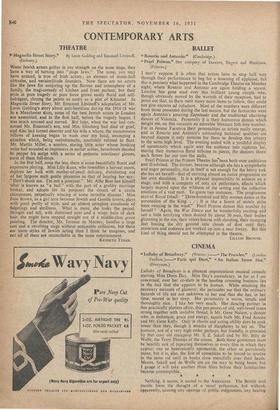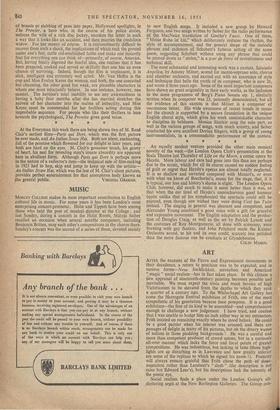CINEMA
"Lullaby of Broadway." (Warner.)---,, The Prowler." (London Pavilion.)-■" Paris qui Dort," "An Italian Straw Hat." (Everyman.) Lullaby of Broadway is a pleasant unpretentious musical comedy starring Miss Doris Day. Miss Day's ascendancy, as far as I am concerned, over her co-stars in the hoofing crooning business lies in the fact that she appears to be human. While retaining the necessary measure of glamour, she persuades me that the ordinary hazards of life are not unknown to her and that she has, in her time, snored in her sleep. Her personality is warm, simple and thoroughly nice. I like her very much. Her dancing partner in this practically plotless affair, this pot-pourri of old, well-loved tunes strung together with invisible thread, is Mr. Gene Nelson, a dancer who, in technique, grade and energy, equals both Mr. Fred Astaire and Mr. Gene Kelly. Only in charm and acting ability does he rank lower than they, though it smacks of blasphemy to say so.'The humour, not of a very high order perhaps, but friendly, is provided by that cosy old malaprop Mr. S. Z. Sakall and by Mr. Billy de Wolfe, the Terry Thomas of the screen. Both these gentlemen must be heartily sick of repeating themselves in every film in which they appear, one so benevolently spoonerish, the other so garrulously inane, but it is, alas, the fate of comedians to be forced to revolve In the same rut until its banks close mercifully over their heads. Messrs. Sakail and de Wolfe are on the way to being bores, but 1 gauge it will take another three films before their familiarities become contemptible.
Nothing, it seems, is sacred to the Americans. The British soul recoils from the thought of a venal policeman, but without, apparently, causing any upsurge of public indjgnation, any beating
of breasts or stabbing of pens into paper, Hollywood spotlights, in The Prowler, a hero who, in the course of his police duties, seduces the wife of a rich disc jockey, murders the latter in such a way that it looks like an accident, and then marries the credulous widow. For her money of course. It is extraordinarily difficult to recover from such a shock, the implications of which rock the ground under one's feet, rattle old-established faiths and make one instantly fear for everything one can think of—primarily, of course, America. But, having finally digested the fearful idea, one realises that it has been prepared, cooked and served so skilfully that one has an even chance of surviving. Indeed, though the film is unpleasant, it is slick, intelligent and extremely well acted. Mr.. Van Heflin is the cop and Miss Evelyn Keyes the woman, and both, the one conceited but charming, the other good but weak, are plausible characters in whom one must reluctantly believe. In one instance, however, one cannot. The heroine's total inability to see any awkwardness in . having a baby four months after she has married stretches the naïveté of her character into the realms of imbecility, and Miss Keyes must be commended for her faultless acting during this improbable sequence. For people who like their thrillers to lean towards the psychological, The Prowler gives good value.
At the Everyman this week there are being shown two of M. Rend Clair's earliest films—Paris qui Dort, which was , the first picture he ever made, and An Italian Straw Hat. Both are silent, enchanting, full of the promise which flowered for our delight in later years, and both are hard on the eyes. M. Clair's gossamer touch, his gaiety of heart, his zeal for revealing man's innate absurdity are apparent here in ebullient form. Although Paris qui Dort is perhaps more in the nature of a collector's item—the technical side of film-making in 1923 had to hop, skip and jump to keep up with the artistic— An Italian Straw Hat, which was the last of M. Clair's silent pictures, provides perfect entertainment for that amorphous body known as















































































 Previous page
Previous page